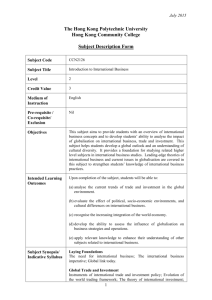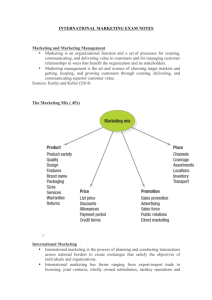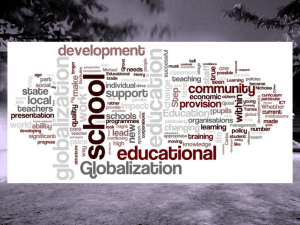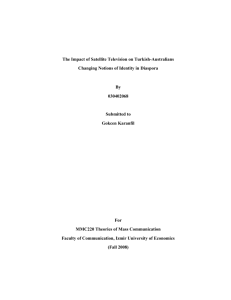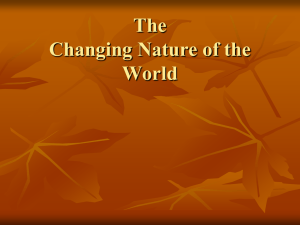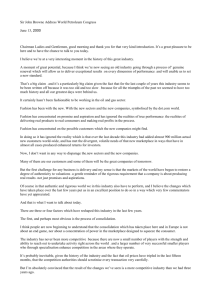Globalisation – Golden Straitjacket or Goldmine?
advertisement
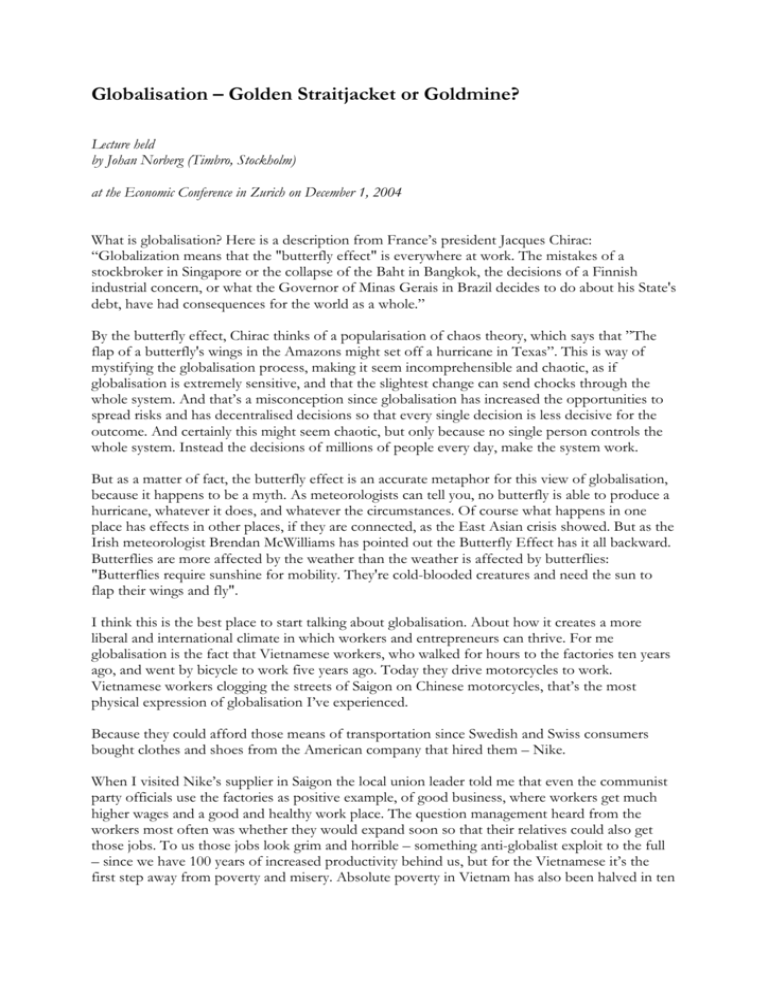
Globalisation – Golden Straitjacket or Goldmine? Lecture held by Johan Norberg (Timbro, Stockholm) at the Economic Conference in Zurich on December 1, 2004 What is globalisation? Here is a description from France’s president Jacques Chirac: “Globalization means that the "butterfly effect" is everywhere at work. The mistakes of a stockbroker in Singapore or the collapse of the Baht in Bangkok, the decisions of a Finnish industrial concern, or what the Governor of Minas Gerais in Brazil decides to do about his State's debt, have had consequences for the world as a whole.” By the butterfly effect, Chirac thinks of a popularisation of chaos theory, which says that ”The flap of a butterfly's wings in the Amazons might set off a hurricane in Texas”. This is way of mystifying the globalisation process, making it seem incomprehensible and chaotic, as if globalisation is extremely sensitive, and that the slightest change can send chocks through the whole system. And that’s a misconception since globalisation has increased the opportunities to spread risks and has decentralised decisions so that every single decision is less decisive for the outcome. And certainly this might seem chaotic, but only because no single person controls the whole system. Instead the decisions of millions of people every day, make the system work. But as a matter of fact, the butterfly effect is an accurate metaphor for this view of globalisation, because it happens to be a myth. As meteorologists can tell you, no butterfly is able to produce a hurricane, whatever it does, and whatever the circumstances. Of course what happens in one place has effects in other places, if they are connected, as the East Asian crisis showed. But as the Irish meteorologist Brendan McWilliams has pointed out the Butterfly Effect has it all backward. Butterflies are more affected by the weather than the weather is affected by butterflies: "Butterflies require sunshine for mobility. They're cold-blooded creatures and need the sun to flap their wings and fly". I think this is the best place to start talking about globalisation. About how it creates a more liberal and international climate in which workers and entrepreneurs can thrive. For me globalisation is the fact that Vietnamese workers, who walked for hours to the factories ten years ago, and went by bicycle to work five years ago. Today they drive motorcycles to work. Vietnamese workers clogging the streets of Saigon on Chinese motorcycles, that’s the most physical expression of globalisation I’ve experienced. Because they could afford those means of transportation since Swedish and Swiss consumers bought clothes and shoes from the American company that hired them – Nike. When I visited Nike’s supplier in Saigon the local union leader told me that even the communist party officials use the factories as positive example, of good business, where workers get much higher wages and a good and healthy work place. The question management heard from the workers most often was whether they would expand soon so that their relatives could also get those jobs. To us those jobs look grim and horrible – something anti-globalist exploit to the full – since we have 100 years of increased productivity behind us, but for the Vietnamese it’s the first step away from poverty and misery. Absolute poverty in Vietnam has also been halved in ten years, and since because of higher incomes, 2.2 million children have gone from child labour to education. As a matter of fact, those working for an American company in low-income countries receive 8 times the average wage in that country. It is not out of generosity, it is because of globalisation. Foreign investments bring management ideas, capital, training and technology. This increases productivity and if a worker can produce more, he is also more worth for the company, and so can receive a higher wage. In the general debate, this is called exploitation, but if better wages is exploitation – then the problem in our world is that the poor countries aren’t sufficiently exploited. And when labour intense goods can be produced in other countries, Sweden and Switzerland can buy it there, and allow capital and labour to go into the sectors where we are more efficient. Consumers get more purchasing power, and can buy new services and goods, which means that the unemployed will bee employed there. Globalisation is nothing else than the market economy – division of labour, forces of competition, and so on – on a bigger scale. Several things that used to be the exclusive property of some Western countries have begun to spread over the world, such as democracy, markets, investments, corporations, ideas, means of communication, science, technology, and so on. Facts and figures show that it works. The World Bank’s Global Economic Prospects 2005, shows that economic growth this year is the highest in 30 years. In developing countries the prognosis is 6.1 percent, and 5.4 and 5.1 percent in 2005 and 2006. This means a per capita growth of more than 4 percent annually. That’s more than twice the growth rate countries like Sweden and Switzerland had when we industrialised. From 1780 it took England 60 years to double its income per capita, 100 years later, Sweden did the same in just 40 years, 100 years later again, Taiwan did it in just ten years. Open poor economies grow faster than open rich ones. It is natural, because they have more latent resources to harness and can benefit from the existence of wealthier nations to which they can export and from which they can import capital and more advanced technology, whereas affluent countries do not have that advantage. But economists have not found any such general connection previously. The reason is simple: the economy in protectionist developing countries can not use these international possibilities, and so grow less rapidly than the affluent countries. But developing countries which had been open to trade and investments, i.e. those most receptive to the influence of the industrial nations, grow more rapidly than the open rich countries. In other words, the rich get richer, and the poor get richer. But the rich do not get richer as fast as the poor. The number of absolute poor – people with less than $1/day – has according to the World Bank been reduced by more than 400 million in the last two decades, even though world population grew by more than 1.5 billion during the same time. And there are some convincing arguments that the poverty reduction has been much bigger than this estimate. Other indicators on living standards from governments, the UN and the World Bank all point in the direction that mankind has never before seen such a dramatic improvement of the human condition as we’ve seen in the last decades, an era when globalisation began to be really global. During the last 30 years chronic hunger and the extent of child labour in the developing countries have been cut in half. In the last half century, life expectancy has gone up from 46 to 64 years, infant mortality has been more than halved, and illiteracy has come down from 70 percent to 23 percent. The progress is the quickest in countries that are globalised, where markets have been opened and foreign investments are welcome. A recent World Bank report concluded that 24 developing countries with a total population of 3 billion are integrating into the global economy more than ever. Their growth per capita has also increased from 1 per cent in the 1960s to 5 per cent in the 1990s. At the present rate, the average citizen in these developing countries will see her income doubled in less than 15 years. Something is being done right, in the world today. Politics without power? This is both because of technological breakthroughs and political decisions. And a very popular conclusion is that this is because politics has become powerless, in face of the technological forces, foreign investors and global institutions. Thomas Friedman at the New York Times, a very astute observer of the globalisation process, has said that nations now are forced into a “Golden Straitjacket”, composed of fiscal restraint and open markets. And he says that: ”The Golden Straitjacket is the defining political-economic garment of globalization. The tighter you wear it, the more gold it produces.” Thomas Friedman likes this straitjacket. Above all, he mentions the gold that it produces. I would mention the liberty it gives the people. We often confuse rulers with the ruled. The fact that rulers lose power does not have to mean that the rulers do, quite the opposite of it means that we get more power as consumers and investors. Most critics of globalisation hate this straitjacket. They say that liberalisation and privatisation is a way of emptying democracy of all its power. But democracy does not mean that governments control as much as possible, it means that the state is controlled by democratic mechanisms. But there is another problem with this idea of the straitjacket. It doesn’t exist. Sure, if people and capital are more mobile, governments have to offer them fairly reasonable conditions to get them to stay, but on the whole, the era of globalisation has come about because of politicians who have realised that lower transaction costs, access to markets, and global production and distribution chains have made it more profitable to go global. In a world where other markets were closed to you, where the capital of rich countries stayed home and where it was impossible to get information or equipment to other countries in a reasonable time, you didn’t stand to gain that much from going global. Now you do. And therefore more and more countries have made the decisions. Globalisation is not a golden straitjacket, it’s a goldmine. And it’s easy to see that great rewards await you if you equip diggers and go out in search for it. But you can stay home, and stay poor. It’s fairly obvious that no one forces North Korea or Burma to globalise. But it’s also obvious that rich countries stop globalisation from working in several sectors, as long as they are willing to pay the price. The agricultural protectionism of the EU – and Switzerland, as well, by the way – is one strong example. It stops developing countries from developing, it locks capital and labour in one of our least efficient sectors, it forces taxpayers of paying half the EU budget in agricultural subsidies and it forces consumers to pay twice as much for the food as they would have on a free market. But nothing else than economic rationality and human decency forces us to abandon it. The European Union has stopped several attempts to subsidise national champions, but this is not a strange, new threat from the outside, this is a disarmament process, which the members have entered because they know that a war about who can pour most public resources into noncompetetive industries is a war with nothing but losers. The big steps towards liberalisation and globalisation around the world has been unilateral decisions on the part of countries who have seen the potential. In his book Free Trade Today, the famous trade economist Jagdish Bhagwati points out that unilateral trade liberalization induces imitation by demonstrating success and by increasing the influence of exporters in other nations. Nations such as Estonia, Australia, New Zealand, Chile, India, Singapore and Hong Kong have demonstrated the success of unilateral free trade reforms. An interesting example is that the EU and Japan refused to negotiate reciprocal reductions in protections for their financial and telecommunications sectors. But when the US successfully opened up these sectors, both the EU and Japan unilaterally reduced protectionism in those sectors. The WTO has been able to make progress only because the member countries got convinced by the value of free trade, and liberalised themselves, and it fails now that there is a lack of interest from the nations. The WTO is like a car without an engine, it has to be pushed by the states in order to move forward. Because governments have liberalised on their own terms and at their own speed, there is a reason to ask whether things really have gone too far or whether they have not even gone far enough. Critics of globalisation say that the strong conditionality that the World Bank and the IMF forces on the developing countries, in exchange for loans and bailouts means that their independence is an illusion. They have to follow the orders. Sure, if they want the loans. But the fact that those structural adjustment loans exist is another way of increasing the choices of poor countries, rather than limiting them. A developing country in fiscal chaos, or a balance-of-payment crisis would have to implement radical, wide-ranging reforms to fix the situation, and restore confidence. Often the loans from the IMF is a way of substituting vague promises of future reforms, for real reforms now. And since the IMF bail out failed investments, they make sure that poor countries receive capital even though they haven’t created an investor-friendly environment. But why then do some economists think that the structural adjustment loans from the World Bank and the IMF are stifling, even though they are systematically ignored? I can’t resist the temptation to quote Bhagwati, this time from his In Defence of Globalisation (not to be confused with an earlier book on globalisation called In defence of Global Capitalism): "Why, then, do splendid economists such as Stiglitz, who was senior vice president of the World Bank, think of conditionality as stifling, as if what is written is what is done? I suspect that this is because they misinterpret as a huge influence the stroking that they receive when they visit these client countries. They are met with excessive courtesy and protocol at the airport, stay in penthouse executive suites, meet with prime ministers and presidents, and wind up feeling that they are more important than they really are. The notion that these countries are playing the game and manipulating them because they carry bags of cash is beyond the egos that rise like helium-filled balloons in the higher-level echelons of the Bretton Woods institutions." (p. 259) So why do we all think that the politicians have lost power? My guess is that they want us to think so. When the traditional left collapsed and social democrats began to accept the market they explained to their voters that they were forced to liberalize because foreign investors demand it. They said that they had to introduce free trade reforms to keep the WTO happy, they had to privatise because they had promised the World Bank to do that, they had to lower taxes because corporations would go abroad otherwise – not because it was good in itself, and would create great benefits. This was an easy way out, a way of convincing voters without having to go to the trouble of being self-critical and explain that they have to re-evaluate everything they believed in. The right made the same mistake. Margaret Thatcher’s argument for liberalization was the TINAdoctrine – There Is No Alternative. A Swedish center-right government echoed her in the beginning of the 90s when they explained that their reforms were ”The Only Way”. But they didn’t mention that this was a desirable way. Whenever the government explain that the people do not have an alternative and that the ideologies are dead, you can be sure that people will get suspicious. And rightly so. They will begin to search for alternatives, just about anything. And that by the way is one of the explanations for the anti-globalisation movement. Voters might be convinced that something is necessary, but when they get the impression that not even the reformers think that reforms are desirable, of course they begin to resent globalization or the particular institution that ”force” these changes upon us. And they will be longing for an oldfashion left or a populist right that don’t simply accept the ”necessary”. Globalisation begins at home Let’s go back to president Chirac’s butterfly effect. The butterfly expert Julian Donahue has been asked what it would take for butterflies to have an impact on the weather, and replied: "If all the members of a particular species of butterfly were to get coordinated and line up on a particular plane, that would have an effect.” And he added “But that would take a level of social organization that butterflies just don't have." Interpreted into globalisation terms it means that globalisation still begins at home. Until and unless countries take the steps of liberalising their economies and open up its markets, we won’t have real globalisation. It’s only the decisions of billions of consumers and investors, and hundreds of governments, that make globalisation possible. If globalisation is nothing more than an extension of the classical market economy, as I have suggested, it means that the country must build liberal institutions back home and get their economies in order, to be able to benefit. And there are so many obstacles to this. For example weak legal structures and property rights. The Peruvian economist Hernando de Soto has showed that poor people in the third world have real estate (buildings and the land they stand on) worth almost 10 trillion dollars more than is officially registered. This is more than the combined value of all companies listed on the 20 biggest stock markets in the world. Without clarity as to who owns what, the property remains “dead capital”. Properties cannot be mortgaged, which would otherwise provide capital for financing the children’s education or investments and expansion of the business. Thus, the most common way for small entrepreneurs in affluent countries to obtain capital is to cut off in developing countries. Millions of capable people with powers of initiative who could be the entrepreneurs of the future become entrapped by poverty. In European countries we have dealt with those problems, but because of an obsession with security and stability, we have made it difficult to start the new businesses that could replace those who fail in international competition. It’s about a lack of competition in our own economies, labour market regulations that discourages entrepreneurs from hiring people, taxes, benefits and labour costs that raise the price of labour above its productivity. The allegation of liberal-capitalist world dominion has to be tempered by the observation that we today probably have the biggest public sectors and the heaviest taxation the world has ever known. To summarise: Businessmen still have to care about the local business climate, just like the butterfly still has to care about the local weather. The fact that the multinational institutions like the WTO only does what the countries tell them, means that a lack of interest in reforms at home, won’t be compensated by a push from abroad, on the contrary, it will stifle the interest at a multinational level as well. National politics and local politics are still the most important forces for good or evil. It is still able to make us benefit from globalisation, or to ruin the whole process. Globalisation starts with local decisions. Global capitalism starts with local capitalism. Not because of golden straitjackets, but because there are so many goldmines out there to discover and explore.
